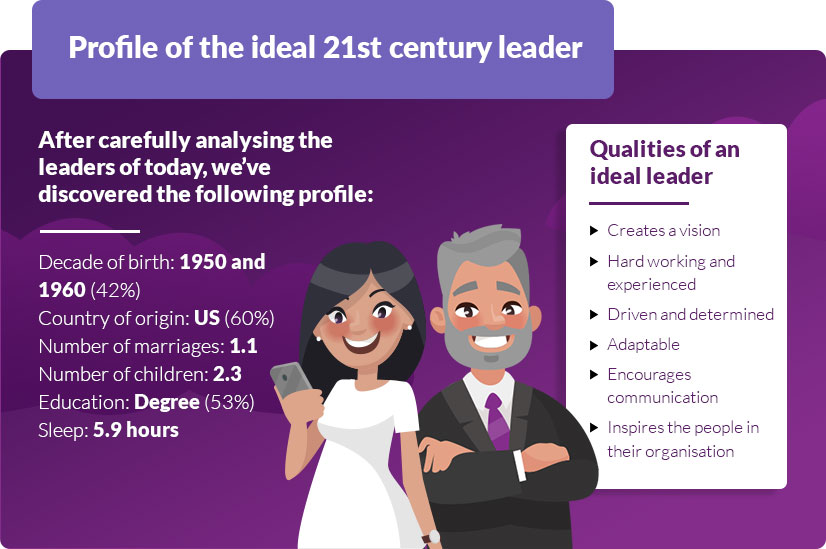
Drop off your CV
At Pareto, we go above and beyond to find the right fit for both you and a prospective employer. Taking people of high potential and placing them in positions where they can excel.
At Pareto, we go above and beyond to find the right fit for both you and a prospective employer. Taking people of high potential and placing them in positions where they can excel.

By Pareto Team

To be a leader in any time or place is demanding and all-encompassing, but to be a leader in the 21st century is set to be an even greater challenge. Our leaders of the future will need very specific skills and attributes to enable them to adapt to turbulent times ahead in business, politics and the wider world.
To discover what it takes, we’ve explored the characteristics of some of the world’s most influential people. We’ve looked at the top 100 leaders of the 20th and the 21st century so far to discover what the leader of tomorrow looks like.
Covering multiple sectors, from politics and activism to technology and entertainment, our chosen leaders are a diverse combination of characters, all with different talents and aims.
With the help of Simon Robinson, Professor of Applied Professional Ethics at Leeds Beckett University, we’ve explored the backgrounds and attributes of these inspirational people to bring you a profile of what an ideal leader might look like in the 21st century.


A leader sits right at the forefront of an organisation, involved in everything from strategizing and planning for future growth to managing people on a day-to-day basis. As such, they need to have a very specific skill set to make it all work. Professor Robinson defines what it takes to inspire others:
“The key responsibility of a leader is creating direction and involving others when determining that direction. Whether it’s people within or outside of the organisation, all stakeholders should be involved and enabled by a leader. They also should have a focus on creativity and encouraging creative response. A leader should also have the capacity to create dialogue and develop focused communication.”
The idea that a leader should have a clear vision, and be able to nurture the growth of their organisation in that direction is not new, but it may mean something completely different to a 21st century leader.

First of all, to understand how successful people became who they are and how future leaders may emulate this, we’ve looked at the course of the careers of 100 leaders from the past century.
We found the average age at which our 100 leaders started their first job was 22.1 years old, and the majority reached their highest position at age 38.7. Professor Robinson explains what this says about the leaders:
“The peak age of a leader reveals some interesting information. There’s a lot of diversity here and that would reinforce the idea that there is no simple developmental line. It says to me that individual circumstances and context plays a big part in creating a leader.”
Those who founded their own business unsurprisingly reached their peak position at a younger age, with an average of just 33.2 years old. Of the 38 founders we examined in our study, 18 of them were in their twenties when they reached their peak and half of those (9) were in the technology sector. Tech is one of the biggest and fastest developing industries in the 21st century, and provides plenty of opportunity for those looking for a fast track to success, with the peak position age sitting at a subjectively young 31.7 years old.
With so many advancements in tech and so many young leaders appearing in this industry, we asked Professor Robinson what he thought differentiates a leader from someone with a great idea:
“A sense of vision is essential to becoming a leader, but that’s not all there is. They have to be able to communicate that vision and the value of it. A successful leader should be able to express what is worthwhile and exciting about what they’re doing, which ties into motivation.”
Sleep is essential for every single one of us, but the image of a sleepless leader staying up all hours of the night to work is ubiquitous. With less sleep and more hours at your desk, you might think you’ll be better placed to stay ahead of the game, never miss an opportunity and get value out of every minute of the day, but is this really true? To understand if you really can become a leader with little or no sleep, we’ve collated available information on the sleeping habits of some of our most influential leaders.
Although the recommended amount of sleep for an adult is between 7-9 hours per night, we found the average amount for a leader, based on the information available on our chosen leaders, is 5.9 hours. We also found that they use this reduced sleep time to wake up early and rise, on average, at 5:30am.

Professor Robinson analysed these results and revealed what these shorter sleeping hours says about a leader:
“When it comes to this evident lack of sleep, I suspect it tells us that a lot of the leaders were driven. Drive is so important to becoming a leader, not just for progress but for other people within their organisation. A driving force brings consistency and commitment to a business.”

Despite these leaders opting for less than the recommended amount of sleep, we found that some of the world’s most influential people, including Bill Gates and Jeff Bezos, get between 7-8 hours of sleep every night.

Education is often considered an essential in today’s working world, but we found that only 53% of the 100 leaders actually hold a Bachelor's degree. Overall, only 21% opted for a Masters and PhDs. With this in mind, it appears a full education might not be essential when hard work and entrepreneurship come into play.

Although education is essential to many employers today and is often necessary to gain a foothold in your chosen industry, an individual with a great idea and an entrepreneurial spirit might just have what it takes to make become a leader. Professor Robinson explains how competency rather than education may be the secret weapon for a leader:
“Leaders emerge from practice, which may or may not mean having a degree. Engineering and creativity brings competency and that is a massively underrated skill for a leader. It’s great to have an immediate vision but it’s the competent, practiced individuals who can see their way through to the results.
“When it’s their time, leaders like Mark Zuckerberg will emerge, degree or not. Context and circumstance is essential, but there has to be an element of determination to keep going and achieve their goals. Not everyone has that.”

Looking at the most prevalent job sectors of our top 100 leaders, we’ve identified technology as the most common area in which to achieve success (28%), followed by retail (21%) and politics (17%). Tech is one of the fastest growing areas in the world today and offers plenty of opportunity for a technically-minded entrepreneur. It’s therefore hardly a surprise it features so prominently for modern leaders.
Nowadays, tech heroes are nothing short of celebrity. Big names like Mark Zuckerburg, Elon Musk and Steve Jobs shine in a crowded industry with their unbelievable success stories and illustrious careers. Innovation is the key to success in this field and opportunities for evolution continue to arise for those people with big ideas and ambition.
The demographic for a leader in tech is slightly different to that of the other sectors. As the larger group, you’d expect the average age to be closer to the overall average of 38.7. However leaders in this area reach their peak 7 years younger than average. Out of 28 technology leaders, more than 1 in 5 (21%) reached their most successful position as their first job – unsurprising if they started their own company straight out of university.

While the profile gives us a picture of some of the demographics of our top 100 leaders, the uniting factors are all about character and behaviours. As Professor Simon Robinson agrees:
“Leaders aren’t different, it is the context that’s different. Everything we know about leadership from the past can be applied to the present and future. Leadership needs vision, dialogue, purpose and worth - the key is to lock into the sense of the uniqueness of the situation.”
Situation aside, there are undoubtedly many people out there with every potential to be a leader. The question is how you unlock or unleash this potential, to bring out the leaders of the future. As technology opens up a wealth of new innovation and opportunities, there are many more chances for new leaders to step in and pave the way. So how do we encourage them?
Jonathan Fitchew, CEO and founder of Pareto, commented on the study: “With the business world constantly growing and developing, being a leader in the 21st century requires a unique blend of skills. Having trained over 100,000 people worldwide, at Pareto we know that strong leadership is not an innate quality, it can be taught and developed. With the right training, anyone can find and build upon their inner leader, which is why as a training company we’re all about helping people to unleash their potential.’
The latest means to unlock this potential comes in the form of the government's apprenticeship reforms. There are now a host of new soft-skill business-focused apprenticeship training courses on offer and key for leadership and management are Team Leader Level 3 and Operations Manager Level 5. These both deliver training designed to elicit the essential leadership traits in their learners.
 |
|
 |
 |
 |
|
If you're looking to recruit or develop leaders in your business, Pareto are market specialists in recruiting and training graduates for careers in sales. We're proud to play a part in creating some of the leaders of the future, like our Grad to Greats. The latest addition to our training are apprenticeships, which set successful leaders like Sir Alex Ferguson and Karen Millen on their paths to success. To find out more, read about our sales recruitment solutions and new Apprenticeships and tell us about the solutions your organisation needs.
